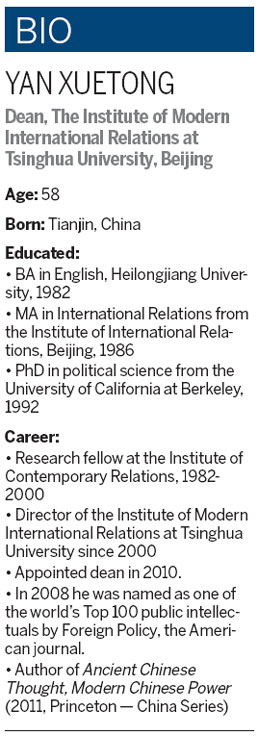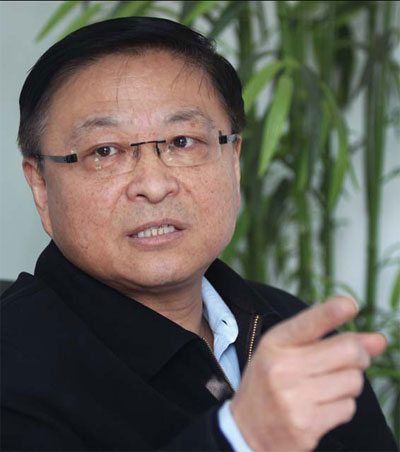Hawk's eye view on foreign policy
Updated: 2011-12-02 07:36
By Andrew Moody (China Daily)
|
|||||||||
|
Foreign policy expert Yan Xuetong says China should follow the US example and build alliances of its own. Liu Zhe / China Daily |
Expert on foreign affairs believes countries need humane authority and meritocracy
Yan Xuetong, regarded as one of China's leading foreign policy "hawks", had again been making the headlines.
An opinion piece just before our interview in the New York Times, entitled How China Can Defeat America, had generated considerable interest around the world.
"It is a very provocative headline. They tell me I can never know the headline before it is printed," he says laughing. "That article has proliferated a lot."
The 58-year dean of the Institute of Modern Foreign Relations at Tsinghua University seems a far too jovial figure to be China's answer to uber neo con Dick Cheney, the former US vice-president.
"Well, my understanding is that I am regarded as a hawk because I admitted the fact the relationship between China and the United States is a competition, one between a rising power and a hegemon," he says.
Yan's mind is very much on the present with US-China foreign policy being center-stage in recent weeks.
First, there was the APEC (Asia-Pacific Economic Cooperation) meeting in Hawaii in November when US President Obama said China could only join the Trans-Pacific Partnership (TPP) free trade area if it made its currency convertible among other reforms.
Secondly, the US leader announced on his subsequent visit to Australia that he was increasing troop deployments in the region.
And thirdly, at the ASEAN (Association of Southeast Asian Nations) meeting in Bali just over two weeks ago, territorial disputes in the Pacific and the South China Sea were put on the agenda despite Beijing preferring to deal with them on a bilateral level.
With all of this, some thought there was a sense of China being ganged up upon.
"I think in China there is a debate. Some people think it is Obama's strategy for the election and that this is not purposely aimed at China but about winning votes. Another group believes that Obama has already determined his policy and won't turn back after the election. These two groups can't agree with each other at the moment," he says.
At least Obama has been polite. The televised debates between the Republican presidential hopefuls have seen quite a lot of bile thrown in the direction of China.
"I think this is very natural. Since the end of the Cold War, when it comes to the election year, the China-US relationship always gets into trouble," he says.

Yan is no cosseted ivory tower academic. The son of an accountant for a State-owned enterprise and a mother who was a university lecturer, he was sent to work as a laborer in the countryside during the "cultural revolution" (1966-76) at the age of 16.
He spent nine years enduring incredible hardship, having to walk barefoot despite the icy conditions in the paddy fields and living in cattle stalls off a diet of steamed corn cakes.
"It made me very tough but not just me, most of my generation. It makes you very driven. It makes you feel there is no difficulty on earth that you cannot overcome."
Yan had to make up for lost time, doing a degree in English at Heilongjiang University in his mid-20s, then an MA at the Institute of International Relations, Beijing.
He went on to do a PhD in political science at the University of California at Berkeley in the early 1990s, establishing American ties that he has maintained ever since.
He now regularly lectures in the United States and in Europe.
Back in China, he has established himself as one of the country's leading international relationship experts through his work first at the government think tank, the Institute of Contemporary Relations, and now at Tsinghua University.
His latest book Ancient Chinese Thought, Modern Chinese Power, was encouraged by none other than former US secretary of state Henry Kissinger.
"I actually wrote the book at his suggestion and he wrote the blurb for it," he says.
The book looks at what foreign policy lessons China and, indeed, other countries, can learn from ancient Chinese history.
He argues that societies ultimately prevail not by use of weapons but by having a humane authority and that one of the successful eras in China was the reign of Emperor Wu between 140 and 86 BC, which was based soundly on Confucianism and the rule of law.
He believes China's modern leaders can learn from that and also from earlier societies being based on a meritocracy and recruiting talented people from around the world for key positions. The Venetian merchant Marco Polo was a government official and Li Bai, the Tang Dynasty poet who served at the ministry of culture, was from Central Asia.
"Look at the situation at the university here. We only have foreigners to teach courses, not to serve as president," he says.
Yan says one of the key problems for China is accepting its new status in the world as a major economic power, which has been reinforced by the global financial crisis.
"We still keep the old policy, meaning low profile, no alliances and taking no leadership. We feel we shouldn't get involved in other people's business and this puts China in a very awkward position," he says.
He believes China should follow the United States' current example and build alliances of its own.
He doesn't think other countries, particularly those in Southeast Asia, should fear China, even if it continues to strengthen its military capability.
He cites the ancient Chinese military strategist Sun Tzu whose argument in his classic work The Art of War was that the best wars are the ones you don't have to fight.
"The Cold War is the best way to victory. That is the perfect result that Sun Tzu argues about. We need to build up our military to protect our expanding national interests," he says.
Yan says that while the last 30 years since reform and opening up in China have been very successful, there is a danger that becoming too obsessed with economic advancement could sap China's power in the world.
He believes growing income inequality in the country, asset bubbles and corruption could erode the very humane authority that societies need to prevail.
"We need to give priority to creating a harmonious society, rather than economic development. If China follows the Japanese strategy and focuses on economic development only, we will have the same fate as the Japanese," he says.
(China Daily 12/02/2011 page24)








